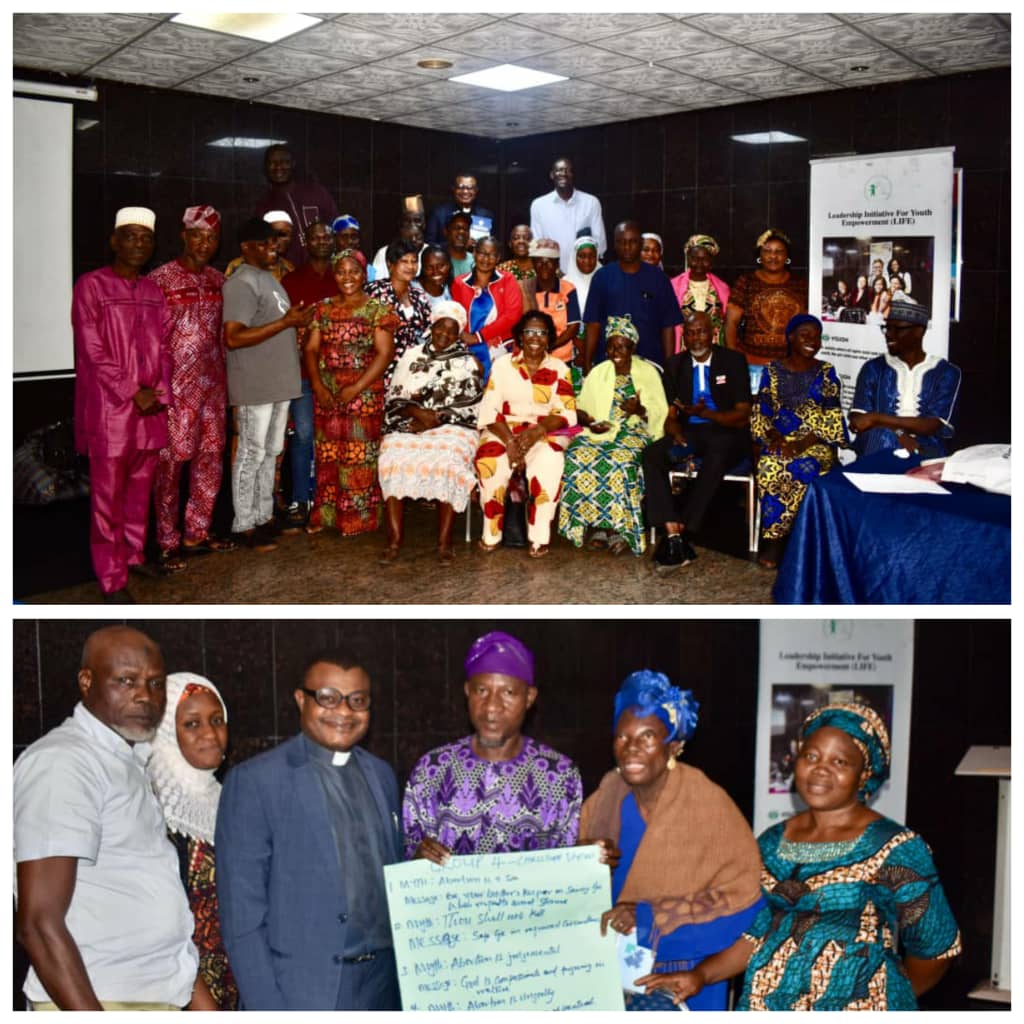Changing The Narrative: How Lagos Is Reimaging Abortion Care Through Empathy & Evidence
Posted on October 17, 2025
CYRIACUS IZUEKWE

In the vibrant, ever-changing city of Lagos, Nigeria, discussions about reproductive health are evolving. For decades, abortion has remained hidden behind silence, stigma, and misinformation, often leaving women feeling isolated, uninformed, and vulnerable. However, a new wave of advocacy, led by the Leadership Initiative for Youth Empowerment (LIFE), is challenging these false stories and pushing for a more compassionate, fact-based approach to abortion care.
This isn’t just about correcting facts; it’s about changing hearts, rebuilding trust, and ensuring that every woman who walks into a clinic is met with dignity, not judgment.
What People Think vs. What the Law Says
Ask ten people in Lagos whether abortion is legal, and you’ll probably get ten different answers. Some believe it’s completely banned. Others think it’s only allowed in private hospitals. Many assume that any woman seeking abortion-related care is irresponsible or immoral. These beliefs are not only wrong, they’re dangerous. Under Nigerian law, abortion is permitted when the woman’s life is at risk. While this law is narrow, it is legal and valid. However, because many people are unaware of this exception, it has created a climate of fear and confusion. Women who qualify for safe, legal care often avoid hospitals, fearing arrest, shame, or rejection. “I was told by a neighbor that even asking about abortion could get me in trouble,” said a 27-year-old woman from Ikorodu. “I didn’t know I had a right to ask questions.” This misinformation causes many women to seek help from untrained providers or rely on unsafe methods—putting their health and lives at risk.
How Belief Shapes Care
In Lagos, cultural and religious values are deeply woven into everyday life. While these traditions offer community and moral guidance, they can also reinforce harmful stereotypes, especially around abortion.
Many health workers, raised in the same communities they serve, carry these beliefs into their professional roles. Without proper training, they may view abortion as sinful or shameful, rather than as a medical issue.
“I used to think abortion was always wrong,” admitted a nurse during a LIFE training session in Surulere. “But then I met a patient who was pregnant from rape. That changed everything.”
This shift, from moral judgment to empathetic understanding, is exactly what LIFE hopes to foster.
Between Belief and Duty
Health workers are the backbone of reproductive care. Their words, attitudes, and actions can either build trust or deepen fear. Unfortunately, many women report being treated with suspicion or hostility when seeking abortion-related services, even when their situation falls within legal bounds.
A 2022 survey by the Centre for Reproductive Rights found that 42% of women in Lagos who sought post-abortion care felt judged or mistreated by health professionals. Some were denied treatment outright. Others were scolded, shamed, or made to wait unnecessarily.
“I was bleeding and scared,” said one respondent. “But the nurse kept asking why I didn’t ‘behave myself.’ I almost left.”
These experiences don’t just hurt feelings; they deter women from seeking help, increasing the risk of complications or death.
A Forgotten Lifeline
One of LIFE’s main advocacy goals is to restore the STOP Guideline, a policy framework that allows safe termination of pregnancy under certain conditions, including when a woman’s life is in danger.
Originally created to assist health workers in navigating Nigeria’s restrictive abortion laws, the STOP Guideline provides clarity, protection, and a clear pathway to care. Yet, in recent years, it has fallen into disuse, leaving many providers unsure about their legal options.
“The STOP Guideline gave us confidence,” said Dr. Bamidele, a physician on Lagos Island. “Without it, we’re left guessing, and that’s dangerous for everyone.”
LIFE is working with legal experts, medical associations, and policymakers to revise and update the guideline, ensuring healthcare workers have the tools they need to act responsibly and legally.
How Messaging Shapes Reality
One of the most overlooked aspects of abortion care is communication. From clinic posters to radio jingles, the way we talk about abortion influences how people think about it.
LIFE’s project includes a media literacy component, helping health workers and community leaders craft messages that are accurate, respectful, and inclusive. Instead of fear-based warnings, they promote fact-based education and empathetic storytelling.
“We’re not just correcting myths, we’re changing the tone,” said Ngozi Okeke. “When people hear calm, clear, and caring messages, they listen differently.”
This approach is already making waves. In Agege, a local health center replaced its outdated signage with new posters explaining the legal grounds for abortion and encouraging women to ask questions. Within weeks, the number of clinic visits increased by 18%.
Voices That Heal
LIFE also uses storytelling as a tool for change. Through community theatre, radio dramas, and peer-led podcasts, they share real-life experiences of women, health workers, and families navigating abortion care.
One recent performance in Aswani Market told the story of a teenage girl who became pregnant after assault and was denied care due to stigma. The play ended with a powerful message: “Compassion saves lives.”
“I cried during the show,” said a local pastor who attended. “It made me think differently.” These stories don’t just entertain, they educate, challenge, and inspire.
From Judgment to Joy
At the heart of LIFE’s initiative is its training program for health workers. These sessions extend beyond clinical skills, exploring values, biases, and the emotional impact of care.
Participants engage in role-play, reflective journaling, and group discussions. They learn how to respond to patients with empathy, how to clearly explain legal options, and how to support women through difficult decisions.
“I used to feel conflicted,” said a midwife in Isolo. “But now I understand that my job is to care, not to judge.”
The results speak for themselves. Clinics that participated in LIFE’s training reported increases in patient satisfaction and drops in complaints related to staff attitude.
Why Local Voices Matter
LIFE’s approach is deeply rooted in community engagement. They work with youth groups, religious leaders, market women, and traditional healers to build trust and foster dialogue.
In Okota, a group of young men started a WhatsApp forum to discuss reproductive health myths. In Isolo, an artisan now hosts periodic sessions where members share experiences and learn from experts.
“We realized that change starts with us,” said Gloria, a youth ambassador. “If we don’t speak up, who will?”
This grassroots momentum is essential. It ensures that change is not imposed from above but nurtured from within.
Why This Matters
Unsafe abortion remains a leading cause of maternal mortality in Nigeria. According to the World Health Organization, it accounts for up to 13% of maternal deaths worldwide, and Nigeria contributes substantially to that number (WHO, 2022). But behind every statistic is a story—a woman who didn’t know her rights, a nurse who wasn’t trained to help, a community that stayed silent. LIFE’s initiative serves as a reminder that we can improve. By changing the narrative, training health workers, and engaging communities, we can build a future where every woman feels safe, informed, and supported.
LIFE’s initiative is a reminder that we can do better. By changing the narrative, training health workers, and engaging communities, we can create a future where every woman feels safe, informed, and supported.
A Future Built on Care
Changing how we talk about abortion in Lagos isn’t easy. It means confronting deep-seated beliefs, challenging outdated policies, and reimagining care from the ground up. But it’s possible, and it’s happening.
Thanks to LIFE and its partners, health workers are learning to lead with empathy. Communities are opening up. Women are finding their voices. And the narrative is shifting, from fear to fact, from stigma to support. Because every woman deserves more than survival, she deserves respect, clarity, and care.
Categorised as : News
No Comments »










